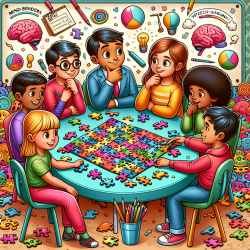As professionals in the field of special education and therapy, it's essential to continuously seek out methods and tools that can enhance our therapeutic skills and contribute to the cognitive development of our students. One such tool that has garnered attention is the Mind Benders Puzzles A1. This blog post explores how practitioners can leverage the outcomes of research presented in this area to improve their skills or encourage further research.
Mind Benders Puzzles A1, as outlined in a special section of the Journal of Speech-Language Pathology and Audiology, presents a unique opportunity for clinicians to engage in computer-based problem-solving activities. These puzzles are designed to enhance deductive reasoning and critical thinking skills, which are crucial components in cognitive development and therapeutic interventions.
Implementing Mind Benders Puzzles A1 in therapeutic sessions can serve multiple purposes. Firstly, it can act as a cognitive exercise that stimulates the brain, encouraging logical thinking and problem-solving skills. This is particularly beneficial for students who require additional support in developing these skills. Secondly, the interactive nature of the puzzles provides a fun and engaging way to maintain the students' interest in therapy sessions, which can sometimes be a challenge.
For practitioners looking to incorporate Mind Benders Puzzles A1 into their sessions, here are some practical tips:
- Start with a demonstration: Introduce the puzzles to students by solving a few examples together. This will help them understand the objective and methodology of the puzzles.
- Encourage independent problem-solving: Once students are familiar with the puzzles, encourage them to solve them independently. This fosters self-reliance and confidence in their problem-solving abilities.
- Facilitate a discussion: After solving the puzzles, engage students in a discussion about the strategies they used. This can provide insights into their thought processes and areas that may need further development.
- Incorporate into daily routines: Make Mind Benders Puzzles A1 a regular part of your therapeutic sessions. Consistent practice can lead to improvements in cognitive skills over time.
While Mind Benders Puzzles A1 offers numerous benefits, it's also important to recognize that every student is unique, and what works for one may not work for another. Therefore, practitioners should use their discretion and adapt their approach based on the individual needs of each student.
In conclusion, Mind Benders Puzzles A1 presents an innovative and effective tool for enhancing therapeutic skills and promoting cognitive development. By integrating these puzzles into therapeutic sessions, practitioners can provide a stimulating and enriching experience for their students. For those interested in exploring this tool further, I encourage you to read the original research paper for a deeper understanding.
To read the original research paper, please follow this link: Mind Benders Puzzles A1.










